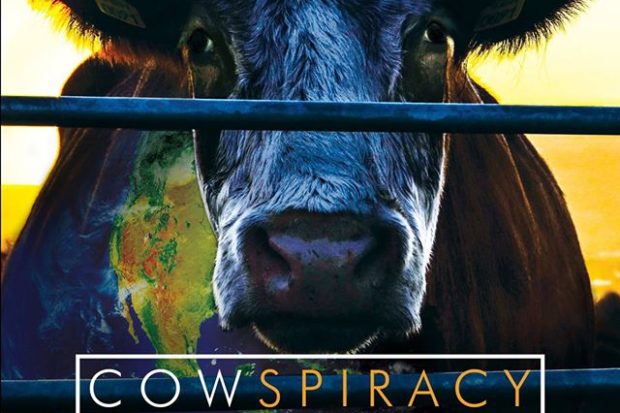
A personal reflection by Camille Russell
With a title like Cowspiracy, it better be good!
Cowspiracy contends that animal agriculture in the 21st century is “the most destructive industry facing the planet today”—a major cause of climate change and environmental degradation. Filmmaker Kip Andersen asks why its role is barely acknowledged by the large environmental organizations, hence the name Cowspiracy. Andersen shares his personal journey from OBE (obsessive-compulsive-environmentalist) making personal changes from investigative journalist to vegan, determined to get the story out. His goal is to educate and engage the public—even at the risk of personal danger.
Throughout the film, we follow Andersen on his journey as he interviews and tries to interview numerous individuals and representatives of organizations. The journey is interspersed with fact sheets and charts. It ends with a rousing call for a vegan diet.
This is a must-see film. The facts presented are compelling. Regardless of what the big environmental nonprofits are or aren’t doing, this is information that everyone should have. Cowspiracy educates us about the environmental impact of our American diet with its high consumption of meat, eggs and dairy produced by industrial agriculture. Pound for pound, beef uses the most resources, but other animal protein sources are also resource-intensive and ocean fishing has its own set of problems.
Cowspiracy assumes that viewers are familiar with many reasons for environmental degradation and puts animal agriculture front and center among those. A significant part of the film compares familiar “human activity” culprits with animal agriculture. Under scrutiny are climate change, deforestation, water use, species extinction, waste (excrement), fisheries and land use. The following are touched on briefly: population growth, animal abuse, health and diet.
Don’t let the call for a vegan diet scare you away. This information is too important to be casually dismissed.
I became aware of the impact of a meat-based diet in 1975 by reading Diet for a Small Planet by Frances Moore Lappe. What I remember of its argument for dietary change was the fact that grain and beans/legumes fed to animals could instead be eaten by humans—a nutritious and much less wasteful alternative. It was a simpler argument lacking the details presented by Cowspiracy. Also, at that time the global food system was much more localized than it is today and the corporate globalization of food was much less. I bought Lappe’s argument and began adding vegetarian and vegan foods to my family’s diet. Another aspect of that diet that appealed to me was the argument that it would be more healthful. I taught vegetarian cooking classes for a while, and many who came did so because of their concern for the treatment of animals—a good reason.
Now 40 years later, I still eat animal protein, but much less than the average American, and I have some thoughts for those who are considering going vegan after seeing the film.
Policy change has a greater impact than individual action. Time spent on working with others to change policy, such as eliminating subsidies for growing corn, soy and water-intensive crops like rice or supporting a farm bill that keeps small family farms viable, will have a bigger payoff than completely shunning animal protein in one’s own diet.
Working with and supporting a group is the way to bring about policy change.
Definitely reduce your consumption of animal protein.
Recognize that changing your diet to a healthy, plant-based diet requires more cooking and planning around food.
Read about healthy vegetarian and vegan diets. It’s more than just cutting things out of the diet.
Recognize that a fundamental change in diet is challenging. Deciding to change is the first step.
If you live with others, have a discussion with them about what will work in the context of the group.
I like Cowspiracy’s message and presentation. Thanks to the film, environmental groups and individuals can no longer ignore the devastation created by animal agriculture. I would have liked the film to do a better job of differentiating between industrial animal agriculture, local small farm agriculture and traditional, sustainable farming still practiced in many rural areas of the world. I’m left questioning the impact of a vegan diet based on industrial farming.
The film makes a strong case for veganism, but this is a meat-eating society. So if the constraints of being a full-time vegan keep a person from getting along with family or focusing on policy change with a group working for a sustainable and just world, I wouldn’t favor it. For many of us, reducing the consumption of animal protein is a good way to go.
For more information on Cowspiracy, visit www.facebook.com/cowspiracymovie and www.cowspiracy.com. Cowspiracy has just become available for a $4.95 download, a $19.95 DVD purchase and streaming on Netflix.
*****
Camille Russell is the Peace Fresno treasurer, a member of the Community Alliance board and a retired teacher. Contact her at camille.russell@att.net.
